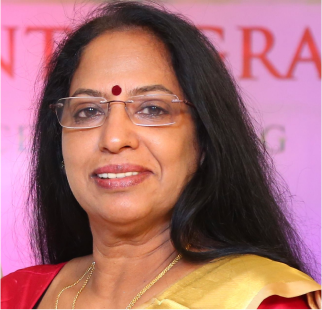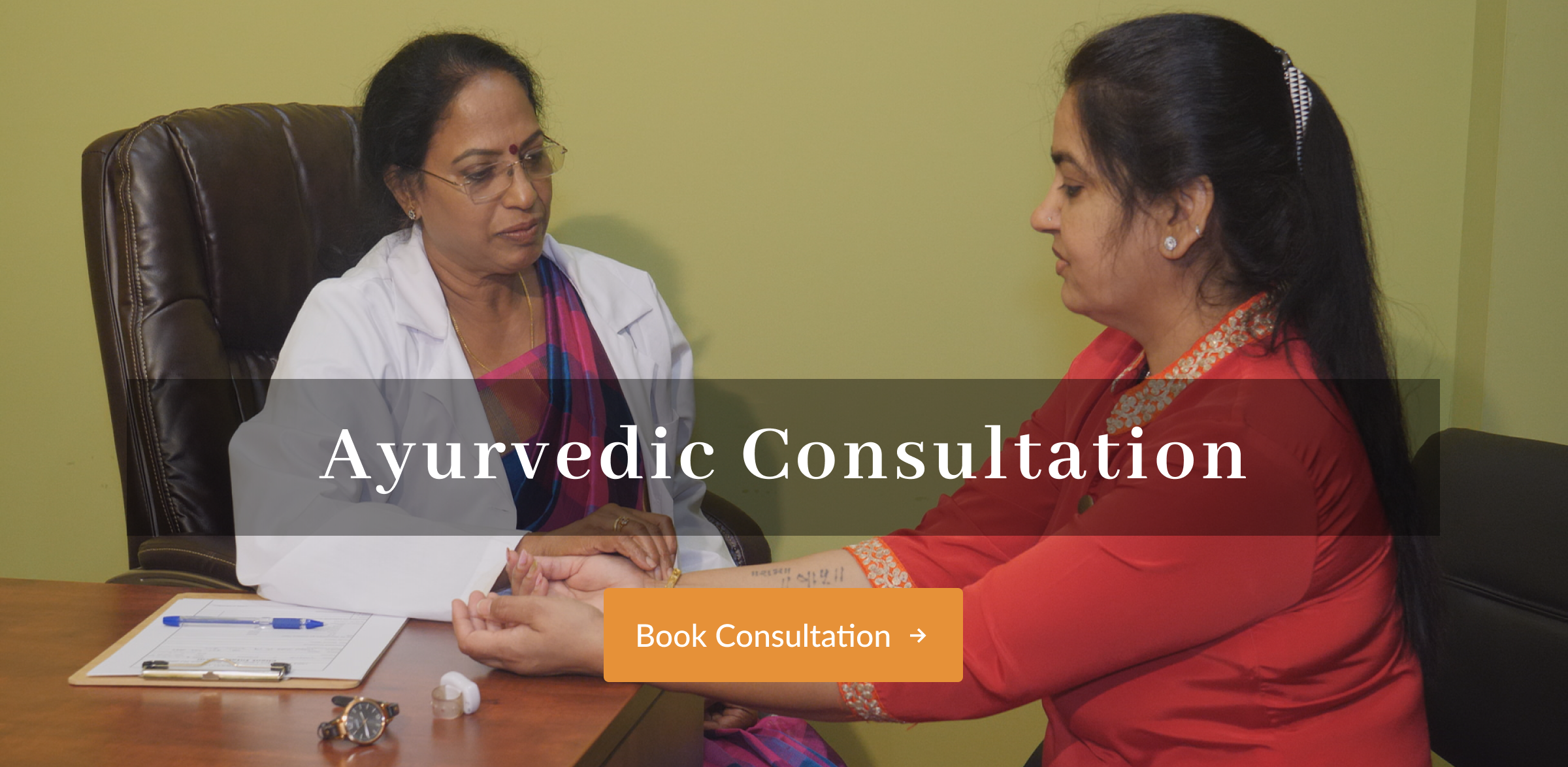About Santhigram Kerala Ayurveda
Santhigram Kerala Ayurveda Group was founded in 1998 in India with a mission to promote holistic health and wellness through the ancient wisdom of Ayurveda. Over the years, we have expanded to multiple locations in USA and Canada and have become a trusted provider of authentic Ayurvedic services and products.
The recent pandemic and the growing demand for managing chronic conditions have strengthened our commitment to promoting the benefits of Ayurveda globally. Our mission is to connect this ancient wisdom for modern living through the seamless integration of traditional knowledge with evidence-based practices.
We believe in the power of Ayurveda to revolutionize health and wellness, and we are committed to transforming this timeless wisdom into effective health and wellness solutions. Ayurveda has much to offer for modern health challenges, and as the demand for natural and preventive strategies continues to rise, we take pride in being at the forefront of promoting the benefits of Ayurveda for global health.
Mission and Vision Statement

Mission Statement
Our mission is to promote holistic health and wellness by making Ayurveda accessible to all. We achieve this by offering a comprehensive range of services that rejuvenate the mind and body. With unwavering dedication, we provide exceptional care through personalized solutions, prioritizing well-being and empowering individuals to make informed health decisions.

Vision Statement
We strive to be the leading force in redefining wellness, where Ayurveda’s ancient wisdom seamlessly blends with modern lifestyles, empowering individuals to live vibrant, purposeful lives. By providing authentic Ayurvedic care and inspiring individuals to embrace Ayurvedic principles in their daily lives, we envision healthier and more fulfilling lives for all.
Our Team
Experience exceptional care from experienced Ayurvedic Practitioners through in-person and online consultations. Benefit from direct interaction, comprehensive assessments, and personalized care based on real-time observations. Additionally, we provide convenient online access to expert practitioners for specialized care with flexible scheduling of appointments that suits you best.

Dr. Ambika Nair
Dr. Ambika Nair, a renowned Holistic Physician with over 30 years of experience in Ayurveda & Holistic Medicine, hails from a family of traditional Ayurvedic physicians. Drawing upon her rich heritage and extensive professional training, Dr. Ambika has crafted a unique treatment system that integrates Ayurveda & Panchakarma therapies, Homeopathy, Siddha, and Bach flower remedies to effectively address various chronic ailments. Known for exceptional diagnostic skills and a proven track record of successfully treating the root cause, Dr. Ambika Nair had the honor of serving as the personal physician to former President of India, Dr. K.R. Narayanan, and Mr. Bhairon Singh Shekhawat, former Vice President of India.
Dr. Nair’s expertise spans different realms of holistic medicine, including Ayurveda, Homeopathy, Bach Flower Remedies, Siddha, Naturopathy, Yoga, and Drugless Therapy. Certified as a Holistic Practitioner in the United States and a Licensed Therapist, Dr. Nair not only brings her exceptional diagnostic skills and expertise in holistic medicine but also extends a warm and empathetic approach, making each patient feel valued and cared for. She truly embodies the essence of Santhigram’s values, with compassionate personalized care, and undivided attention, while maintaining utmost patient confidentiality. Dr. Nair stands as the heart and soul of the Santhigram family.
Experience the convenience of choosing between in-person or online consultations, based on your requirements.
Honor By New Jersey State

Recognition by New Jersey State
Our clients count on Santhigram
ExcellentBased on 47 reviews Trustindex verifies that the original source of the review is Google.
Trustindex verifies that the original source of the review is Google. Madhulika Bala2023-07-18I have been seeing Dr Ambika for more than a decade now. Her advice, therapy and Ayurvedic medicine recommendations are highly effective and without the downside of side effects of western medicine. When my 9 month old had a bad case of eczema, we went to numerous dermatologists but other than steroid ointment no solution was given , I searched for and saw Dr Ambika after which my daughter started seeing improvement within 3 days. Ayurveda may seem pricey at the outset but you avoid mental anguish and costs later down the road. When my husband complained about pain in his back, seeking Dr advice on muscle pain, we were shocked to discover that he had a completely different issue which Dr Ambika help us address with her medication avoiding a further complication. Consider going to her when you are struggling with symptoms that are hard to identify after numerous tests, you want to avoid side effects of conventional medicine specially for children or for general well-being , I will highly recommend Santhigram Wellness Karela Ayurveda. The office staff is very organized and you get appointments at multiple locations quickly .Trustindex verifies that the original source of the review is Google.
Madhulika Bala2023-07-18I have been seeing Dr Ambika for more than a decade now. Her advice, therapy and Ayurvedic medicine recommendations are highly effective and without the downside of side effects of western medicine. When my 9 month old had a bad case of eczema, we went to numerous dermatologists but other than steroid ointment no solution was given , I searched for and saw Dr Ambika after which my daughter started seeing improvement within 3 days. Ayurveda may seem pricey at the outset but you avoid mental anguish and costs later down the road. When my husband complained about pain in his back, seeking Dr advice on muscle pain, we were shocked to discover that he had a completely different issue which Dr Ambika help us address with her medication avoiding a further complication. Consider going to her when you are struggling with symptoms that are hard to identify after numerous tests, you want to avoid side effects of conventional medicine specially for children or for general well-being , I will highly recommend Santhigram Wellness Karela Ayurveda. The office staff is very organized and you get appointments at multiple locations quickly .Trustindex verifies that the original source of the review is Google. Uttam Soni2023-07-07I recently had the pleasure of visiting Santhigram Wellness Center in North Brunswick, NJ, and I must say it exceeded all my expectations. Coming of a terribly long recovery period post my ankle surgery and its after effects, I felt a sense of tranquility and peace that instantly put me at ease, the moment I soke to Dr. Ambika. She diagnosed the problems holistically and connected with me at personal level, helping me feel comfortable with the treatment plan that was put together The ambiance of the center is simply delightful, with a welcoming atmosphere. The staff members are incredibly warm and friendly, making you feel like a valued guest from the very beginning. Their professionalism and genuine care for your well-being are evident in every interaction. The range of wellness services offered at Santhigram is truly impressive. Whether you're seeking relaxation, stress relief, or healing, this center has it all. I opted for their Ayurvedic massage, and it was an absolute game-changer. My therapist, Mr. Nishad was highly skilled and knowledgeable, tailoring the treatment to my specific needs. The experience was incredibly rejuvenating, leaving me feeling balanced and revitalized. Santhigram Wellness Center also provides Ayurvedic consultations, which I highly recommend. The Ayurvedic doctor took the time to understand my concerns and provided valuable insights into improving my overall health and well-being. Their holistic approach and attention to detail were truly commendable. In conclusion, Santhigram Wellness Center in North Brunswick is a hidden gem for anyone seeking genuine wellness and healing. The tranquil ambiance, knowledgeable staff, and wide range of Ayurvedic services make it a haven for rejuvenation. I cannot recommend this center enough and will definitely be returning for more wellness experiences in the future.Trustindex verifies that the original source of the review is Google.
Uttam Soni2023-07-07I recently had the pleasure of visiting Santhigram Wellness Center in North Brunswick, NJ, and I must say it exceeded all my expectations. Coming of a terribly long recovery period post my ankle surgery and its after effects, I felt a sense of tranquility and peace that instantly put me at ease, the moment I soke to Dr. Ambika. She diagnosed the problems holistically and connected with me at personal level, helping me feel comfortable with the treatment plan that was put together The ambiance of the center is simply delightful, with a welcoming atmosphere. The staff members are incredibly warm and friendly, making you feel like a valued guest from the very beginning. Their professionalism and genuine care for your well-being are evident in every interaction. The range of wellness services offered at Santhigram is truly impressive. Whether you're seeking relaxation, stress relief, or healing, this center has it all. I opted for their Ayurvedic massage, and it was an absolute game-changer. My therapist, Mr. Nishad was highly skilled and knowledgeable, tailoring the treatment to my specific needs. The experience was incredibly rejuvenating, leaving me feeling balanced and revitalized. Santhigram Wellness Center also provides Ayurvedic consultations, which I highly recommend. The Ayurvedic doctor took the time to understand my concerns and provided valuable insights into improving my overall health and well-being. Their holistic approach and attention to detail were truly commendable. In conclusion, Santhigram Wellness Center in North Brunswick is a hidden gem for anyone seeking genuine wellness and healing. The tranquil ambiance, knowledgeable staff, and wide range of Ayurvedic services make it a haven for rejuvenation. I cannot recommend this center enough and will definitely be returning for more wellness experiences in the future.Trustindex verifies that the original source of the review is Google. Renjith Kumar2023-06-30Helps to Lowers My Blood Pressure, Cholesterol, reduce my Stress and Anxiety. Thank u very much Dr. Ambika NairTrustindex verifies that the original source of the review is Google.
Renjith Kumar2023-06-30Helps to Lowers My Blood Pressure, Cholesterol, reduce my Stress and Anxiety. Thank u very much Dr. Ambika NairTrustindex verifies that the original source of the review is Google. Swami Prajñananda Saraswati2023-06-30Dr. Nair is highly skilled and knowledgeable as well as deeply caring. This is a rare and beautiful combination. She has helped me with acute and chronic acid reflux. When I started seeing her, my condition was at an 8 or 9 (out of 10). And since meeting with her, I am very much improved. I used to get acid reflux every day. Now, if I do get it, it is very mild and the times are few and far between. Since this has been a lifelong condition, I am very grateful for this relief. Another thing about Dr. Nair is she makes herself so available. If anything comes up for you she is responsive. She will meet with you and share advice on what to do next. I feel very well taken care of by Dr. Nair. She has a big heart and is a wealth of knowledge. You will be in good hands when you work with her.Trustindex verifies that the original source of the review is Google.
Swami Prajñananda Saraswati2023-06-30Dr. Nair is highly skilled and knowledgeable as well as deeply caring. This is a rare and beautiful combination. She has helped me with acute and chronic acid reflux. When I started seeing her, my condition was at an 8 or 9 (out of 10). And since meeting with her, I am very much improved. I used to get acid reflux every day. Now, if I do get it, it is very mild and the times are few and far between. Since this has been a lifelong condition, I am very grateful for this relief. Another thing about Dr. Nair is she makes herself so available. If anything comes up for you she is responsive. She will meet with you and share advice on what to do next. I feel very well taken care of by Dr. Nair. She has a big heart and is a wealth of knowledge. You will be in good hands when you work with her.Trustindex verifies that the original source of the review is Google. Sridhar Ranganathan2023-06-30Received 3 weeks of therapy at the North Brunswick location and was thoroughly impressed with the helpfulness and flexibility of the staff. I was also very happy with the quality of care I received and am confident that my health is in great hands.Trustindex verifies that the original source of the review is Google.
Sridhar Ranganathan2023-06-30Received 3 weeks of therapy at the North Brunswick location and was thoroughly impressed with the helpfulness and flexibility of the staff. I was also very happy with the quality of care I received and am confident that my health is in great hands.Trustindex verifies that the original source of the review is Google. Ravi B2023-06-29We are fortunate to have come in contact with Dr Nair and her practice. She is truly gifted and has helped everyone in our family with different issues and health concerns. We love Dr Nair and everyone at the facility!Trustindex verifies that the original source of the review is Google.
Ravi B2023-06-29We are fortunate to have come in contact with Dr Nair and her practice. She is truly gifted and has helped everyone in our family with different issues and health concerns. We love Dr Nair and everyone at the facility!Trustindex verifies that the original source of the review is Google. Padmashri Ashish2023-06-29Great place to go for improving wellness! Fantastic therapists, most friendly staff always willing to find an appointment as soon as possible! Transformative experience!Trustindex verifies that the original source of the review is Google.
Padmashri Ashish2023-06-29Great place to go for improving wellness! Fantastic therapists, most friendly staff always willing to find an appointment as soon as possible! Transformative experience!Trustindex verifies that the original source of the review is Google. Fatima Sultana2023-06-20Awesome Doctor who gave me second life and Friendly staff .
Fatima Sultana2023-06-20Awesome Doctor who gave me second life and Friendly staff .
Frequently asked question
Ayurveda, derived from the Sanskrit words “Ayur” (life) and “Veda” (knowledge/science), translates to “knowledge of life” or “science of life”. It is one of the oldest traditional systems of medicine recognized worldwide. This holistic science holds the key to living a healthy and joyful life in perfect harmony with nature. With a focus on personalized wellness and disease prevention, Ayurveda acknowledges the intricate connection between the body, mind, and spirit, as well as the unique requirements for a fulfilling life. Through personalized diet, exercise, and healthy lifestyle practices, Ayurveda empowers individuals to optimize their overall well-being, proactively safeguard against the onset of illnesses, and promote healthy aging.
Ayurveda is believed to be several thousand years old, with estimates ranging from 5,000 to 3,000 years ago. Its origin can be traced back to the Vedic period in ancient India, during which the foundational principles and practices were developed and documented. It embodies the timeless wisdom of unity and rhythm between individuals and nature, as well as the profound interconnection of body, mind, and spirit. Over the centuries, Ayurveda has evolved and expanded, incorporating knowledge and wisdom from various sources, making it a comprehensive system of holistic health and well-being.
Ayurvedic principles are based on the Tridosha theory, which perceives the human body as a microcosm reflecting the vast universe. Elements, energies, and processes intricately interact to maintain a delicate balance. The five elements—air, water, fire, earth, and space (Panchamahabhutas)—present in the human body harmoniously combine to form three biological energies known as doshas: Vata, Pitta, and Kapha. The three doshas (tridoshas) govern biological functionality, and the unique proportions of doshas contribute to individual variations, akin to the distinctiveness observed in fingerprints. The mind, body, and soul constantly interact with the external environment, and Ayurveda seeks to restore equilibrium between the individual and the universe, promoting holistic well-being and balance.
Ayurveda perceives doshas as fundamental bio energies that exert profound effects on both the body and mind. The three doshas—Vata (air and space), Pitta (fire and water), and Kapha (earth and water)—are specific combinations of the five universal elements known as Panchamahabhutas. Vata governs movement, Pitta regulates metabolism, and Kapha maintains structure and stability. While the elements themselves are inert, the dynamic interaction of the three doshas provides a framework for understanding the functioning of the body and mind. Every individual possesses a distinctive doshic constitution, that determines their physical and mental attributes. A harmonious balance of doshas is crucial for optimal well-being, while imbalances can manifest as various ailments.
In Ayurveda, “balance” is a fundamental concept that signifies a harmonious state of the three doshas, crucial for promoting optimal body functions and nurturing mental well-being. Achieving this balance leads to vibrant health, vitality, and contentment, while imbalances can give rise to health issues. Ayurvedic practices aim to revive and nurture balance through positive changes in diet, lifestyle, herbal interventions, and mindful practices. These practices emphasize restoring and maintaining balance to promote overall well-being.
Prakriti, also known as the Ayurvedic constitution, refers to the unique physical, mental, and emotional makeup of an individual. It is determined at the time of conception and remains constant throughout life. Prakriti is shaped by the dynamic combination of Vata, Pitta, and Kapha in unique proportions, defining an individual’s inherent characteristics, tendencies, and susceptibility to specific health disorders. While Prakriti provides a blueprint for one’s constitution, it does not determine their destiny. Choices and the environment can either support or challenge Prakriti. Awareness of one’s Prakriti allows individuals to make conscious decisions regarding their diet, lifestyle, and daily routines that align with their constitution.
In Ayurveda, the concept of ‘healthy’ is synonymous with ‘Swasthya’, which reflects the harmonious state of the mind, body, and soul. According to Ayurveda, true health is achieved when the doshas are balanced, digestion is strong, bodily tissues are nourished, and waste products are efficiently eliminated. Additionally, a healthy individual experiences vitality, contentment, and a harmonious connection with their environment.
No. Ayurveda is a rational science that embraces universal principles. While it originated in a cultural and philosophical context, Ayurveda is not tied to any particular religion. It is a practical approach to wellness that emphasizes balance and personalized care. Ayurveda can be integrated into anyone’s life, regardless of their religious or spiritual beliefs.
No, following a vegetarian diet is not mandatory for an Ayurvedic lifestyle. Ayurveda recognizes individual dietary needs based on constitution and imbalances. While advocating plant-based diets for health benefits, Ayurveda allows moderate consumption of lean meat. The focus is on balance, mindful eating, and prioritizing nourishment for overall well-being. For personalized dietary recommendations, consult an Ayurvedic practitioner.
Incorporating Ayurvedic herbal supplements can be beneficial for enhancing overall health. However, it is essential to take them in compatible combinations and align them with your individual constitution and specific health concerns. It is recommended to consult an experienced Ayurvedic practitioner for expert advice and to ensure the safe and effective use of herbal supplements in improving your health.
In general, it is not necessary to take additional vitamin and mineral supplements alongside Ayurvedic herbal supplements. Ayurveda emphasizes obtaining essential nutrients from balanced and nutritious foods and herbs. However, it is important to consult with your primary healthcare provider before making any changes to your supplement regimen.
Incorporating Ayurvedic herbal supplements can be beneficial for enhancing overall health. However, it is essential to take them in compatible combinations and align them with your individual constitution and specific health concerns. It is recommended to consult an experienced Ayurvedic practitioner for expert advice and to ensure the safe and effective use of herbal supplements in improving your health.
Ayurveda, renowned for its holistic and non-invasive approach, offers effective solutions for managing chronic pain backed by scientific evidence. By addressing the root causes of pain, Ayurveda provides long-lasting relief through personalized therapies. Therapeutic procedures like Abhyanga (massage with medicated oils), Elakizhi (massage with medicated leaves), and Panchakarma (detoxification) offer significant pain relief. These procedures improve circulation, eliminate toxins, reduce inflammation, promote relaxation and pain relief, thereby reducing opioid dependency. Shirodhara, an immensely soothing therapy where warm herbal oil is gently poured on the forehead, has shown remarkable effectiveness in relieving chronic headaches and migraines. Consult with an experienced Ayurvedic practitioner to explore personalized pain management options and enhance your well-being.
Ayurveda does not claim to ‘cure’ cancer, but provides a unique perspective to support cancer care by offering holistic and personalized approaches to enhance overall well-being. Ayurvedic practitioners work alongside conventional cancer treatments, providing supportive care to manage chemotherapy side effects, boost immunity, and improve quality of life. Consulting both an oncologist and an experienced Ayurvedic practitioner ensures integrated care for optimal well-being.
Yes. Obesity known as Sthaulya or Medoroga in Ayurveda, stems from a sedentary lifestyle, poor diet, stress, and an imbalance in the Kapha dosha. This disrupts digestion, slows metabolism, and leads to toxin build up, causing excessive fat accumulation. Ayurveda tackles obesity holistically with dietary adjustments, lifestyle changes, herbal remedies, and personalized therapies to eliminate toxin, restore equilibrium.
Ayurveda and Yoga are sister sciences that have evolved together over thousands of years in India. Both systems share a common philosophical foundation and have flourished in parallel. Ayurveda, the science of life, focuses on achieving balance and optimal health through lifestyle practices, diet, and natural remedies. Yoga, on the other hand, is a spiritual and physical discipline that fosters strength, flexibility, and mental clarity through postures, breathwork, and meditation. Together, Ayurveda and Yoga offer a synergistic approach to overall well-being, integrating the wisdom of the body and mind to cultivate inner balance, vitality, and self-empowerment.
Ayurveda embraces a personalized whole-system approach that caters to the unique needs of each individual for holistic well-being, rejecting a one-size-fits-all approach. The focus is on health promotion, disease prevention and addressing the root cause of health issues rather than mere symptom management. Ayurveda nurtures the body’s innate healing capacity for long-term well-being using natural ingredients and non-invasive procedures. In nature, everything is interconnected, intertwined, and harmoniously balanced. Ayurveda, with its holistic approach and deep connection with nature, reminds us of this profound truth, guiding us towards better health and well-being, while emphasizing the importance of maintaining a harmonious and sustainable relationship with our environment.
Not necessarily. This is a common misconception about Ayurveda. Some ailments may require shorter treatment duration, while others may take longer. Healing with Ayurvedic treatment varies based on factors like age, disease type, severity and extent of doshic imbalance. By identifying and addressing the root causes of imbalances, Ayurveda utilizes detoxification, natural remedies, and non-invasive methods to activate the body’s innate healing mechanisms, which require time. Effective outcomes require patience and adherence to the treatment regimen.








